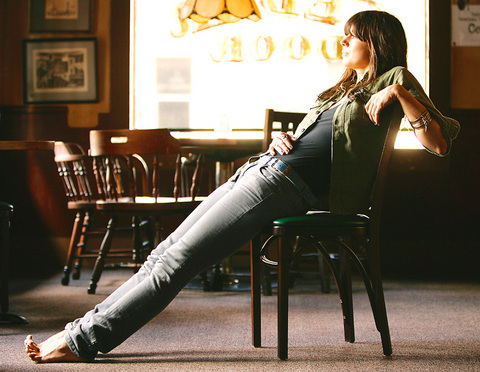Another day, another fifth of Scotch.
And that wasn't all. Chan Marshall said her mornings began with a minibar's worth of Jack Daniel's, Glenlivet and Crown Royal. Mini bottles depleted, this indie singer-songwriter, known as Cat Power, would nurse a bottle of Scotch over the course of the day. On nights she performed, she took the anti-anxiety drug Xanax.
By the time she would weave onstage, beer in one hand, cigarette in the other, Marshall, 34, was wasted. And it showed. It would seem that every fan has a Cat Power concert story: The time she mooned the audience, cursed out techies, talked to a squirrel (outdoors), played three chords and changed her mind (song after song) or played fragments of a few songs and then told everyone to get out, even encouraging fans to sue her.

PHOTO: NY TIMES NEWS SERVICE
That was the old Chan Marshall.
The new Chan Marshall is, by most accounts, significantly improved, as critics have widely noted this year. Reviewing one of Cat Power's performances at Town Hall in June, Jon Pareles of the New York Times wrote, "To see her so comfortable onstage was no small surprise to her longtime fans," and Time Out New York called the shows "triumphant, in the classic show-biz sense."
Of the New York audiences, Marshall said: "I never noticed they really liked me before. Man, these people stuck with me."

Performing at Irving Plaza in Manhattan last week, she playfully plucked and strutted with a sly grin, as if to say, "I see you seeing me, and I like what we see." Sure, audiences saw trademark kooky behavior, some awkward fidgeting, but she made it through her set, words and music intact.
Afterward Marshall (whose first name is pronounced shawn) spoke at length for the first time about her hospitalization and recovery. In jeans and a black tank top, wearing large, round copper earrings, she smoked Parliaments and sipped green tea in her room at the Mercer Hotel in SoHo. She said she was sober and happy. She qualified the term sober: She owned up to having had seven drinks in seven months.
Seven months out of the hospital, and with 47 gigs under her belt in that time, Marshall said that she took Seroquel to calm her enough to sleep, and the antidepressant Effexor, and that she made a concerted effort to eat healthfully. As a result, she said, she is feeling better.
Her drinking began when she was young, she said. Very young. As Marshall tells it, her mother gave her beer in a baby bottle and she grew up spending time in bars. As a teenager she drank and got stoned, which led to other drugs. She pinpointed her nonstop touring in 1998 as the catalyst for her descent into life-altering, chronic substance abuse.
By 2003 the downward spiral had accelerated. "Even playing all my shows I was always intoxicated, always kind of not there, which led to the depression," Marshall said. "It was more about the uncomfortableness with just being in my own skin, and that's why the alcohol was always with me."
With bizarre stage antics and aborted concerts, her erratic reputation was firmly established. Reviewing a show in the New York Times in 1999, the critic Ben Ratliff described her set as "staggering for its inversion of standard rock performance ethics," adding, "Gone was the idea of exultation, or of showing what one can do; in its place was outrageously passive-aggressive behavior and nonmusicianship."
Still, fans flocked, some more than once, to see the singer with the long bangs obscuring her face -- and to see a train wreck. Yet despite her condition, and with the help of veteran Memphis soul musicians backing her up, she managed in three days in August 2005 to record her now critically lauded seventh album, The Greatest.
About two weeks before its release in January, Marshall said, she lost her mind: "I was looking at death. I wanted to die." Holed up in her Miami apartment for seven days, she turned off the phone, played Miles Davis on repeat, stopped eating and sleeping. She drank to oblivion and prayed to die.
Susanna Vapnek, a painter, came over to check on her friend. Marshall was acting bizarrely, obsessively chasing "bad spirits" around her apartment with a lighter and sage. Vapnek bathed her and stayed by her side. Eight hours later she took Marshall to Mount Sinai Medical Center in Miami, where she was admitted.
Confined for psychiatric treatment, Marshall recalled refusing to bathe, hiding from her reflection and wanting to be drunk. "I asked God, I said, I'm tired, I can't do this," she said. "I was asking him to just take me." She was terrified by the other patients who screamed at night and were comatose during the day.
After seven days in the hospital she was allowed to leave. "It was like I was in glue," she said of the heavy doses of lithium given her.
Even though The Greatest was getting good reviews, a tour in support of the record had to be postponed because of her problems. Her label, Matador, estimated that it lost more than US$100,000 on marketing and promotion, paying her supporting band (including a onetime member of Al Green's band) and canceled shows.
Once the tour got under way in April, Matador bought insurance to be on the safe side. But now that the tour is a success, and the album has sold more than 100,000 copies, Matador is rereleasing the record, with new album cover art and a new promotional push.
The onstage anxiety is still there, Marshall admitted. But she said her self-hatred had abated, and in its place stood a woman ready to engage her fans.
On the heels of 11 shows in September, she plans to take October off to relax and then resume touring in Europe in November. Her next album, Sun, is already written, and she talks of a second covers album; top of the list are James Brown and Billie Holiday songs.
Like Will Oldham, another indie-folk rocker who is currently starring in the film Old Joy, Marshall is considering a foray into acting. She said that the cult director Wong Kar-wai invited her to play Jude Law's ex-lover in the movie he is now shooting. Wong, she said, told her he was in the habit of playing The Greatest for his actors before each scene.
Marshall spoke of auditioning to join the cast of Saturday Night Live next summer. Then again, maybe her future involves domesticity. She said she was ready for a relationship and wanted to have children.
"My favorite things in the world are cookin', kids and animals and falling in love," Marshall said, "but you don't get to do that all the time."

Most heroes are remembered for the battles they fought. Taiwan’s Black Bat Squadron is remembered for flying into Chinese airspace 838 times between 1953 and 1967, and for the 148 men whose sacrifice bought the intelligence that kept Taiwan secure. Two-thirds of the squadron died carrying out missions most people wouldn’t learn about for another 40 years. The squadron lost 15 aircraft and 148 crew members over those 14 years, making it the deadliest unit in Taiwan’s military history by casualty rate. They flew at night, often at low altitudes, straight into some of the most heavily defended airspace in Asia.

Taiwan’s democracy is at risk. Be very alarmed. This is not a drill. The current constitutional crisis progressed slowly, then suddenly. Political tensions, partisan hostility and emotions are all running high right when cool heads and calm negotiation are most needed. Oxford defines brinkmanship as: “The art or practice of pursuing a dangerous policy to the limits of safety before stopping, especially in politics.” It says the term comes from a quote from a 1956 Cold War interview with then-American Secretary of State John Foster Dulles, when he said: ‘The ability to get to the verge without getting into the war is

Like much in the world today, theater has experienced major disruptions over the six years since COVID-19. The pandemic, the war in Ukraine and social media have created a new normal of geopolitical and information uncertainty, and the performing arts are not immune to these effects. “Ten years ago people wanted to come to the theater to engage with important issues, but now the Internet allows them to engage with those issues powerfully and immediately,” said Faith Tan, programming director of the Esplanade in Singapore, speaking last week in Japan. “One reaction to unpredictability has been a renewed emphasis on

Beijing’s ironic, abusive tantrums aimed at Japan since Japanese Prime Minister Sanae Takaichi publicly stated that a Taiwan contingency would be an existential crisis for Japan, have revealed for all the world to see that the People’s Republic of China (PRC) lusts after Okinawa. We all owe Takaichi a debt of thanks for getting the PRC to make that public. The PRC and its netizens, taking their cue from the Chinese Communist Party (CCP), are presenting Okinawa by mirroring the claims about Taiwan. Official PRC propaganda organs began to wax lyrical about Okinawa’s “unsettled status” beginning last month. A Global